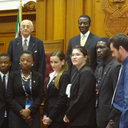
Francis LyallUniversity of Aberdeen | ABDN · School of Law
Francis Lyall
M.A. LL.B. LL.M. Ph.D.
About
79
Publications
6,228
Reads
How we measure 'reads'
A 'read' is counted each time someone views a publication summary (such as the title, abstract, and list of authors), clicks on a figure, or views or downloads the full-text. Learn more
236
Citations
Introduction
Skills and Expertise
Publications
Publications (79)
The book examines how International Law has extended and to cope with developments in technology. Sometimes international organisations have been created Areas covered are the Law of the Sea, Maritime Law, Aviation, Telecommunications, Postal Services, Space Law, Mensuration and Standards.
Francis Lyall and Paul B. Larsen have been involved in teaching and researching space law for over 50 years. This new edition of their well-received text gathers together their knowledge and experience in readable form, and covers developments in all space applications, including space tourism, telecommunications, the ITU and finance. With an exten...
Christian Law: Contemporary Principles. NormanDoe. Cambridge University Press, Cambridge, 2013, xiv + 434 pp (hardback £75) ISBN: 987-1-107-00892-8. - Volume 17 Issue 1 - Francis Lyall
The International Telecommunication Union (ITU) and the Universal Postal Union (UPU) are the two major international organisations that are involved in the regulation of international communications. The ITU deals with electronic communications including radio. The UPU deals with mail. As such, both organisations are of major importance in modern l...
The concept of ‘astronaut’ as found in law in the ‘space treaties’ and elsewhere does not fit well with the modern proposals for commercial space tourism. Will the ‘rescue and return’ provisions apply to commercial flights? Many national laws will apply to space tourism but for the future the international legal regime should be reconsidered. Final...
The use of radio in SETI is subject to international rules agreed through the International Telecommunication Union. These are summarised. An opportunity for their revision will arise in 2012. Suggestions may be made.
The International Mobile Satellite Organisation (IMSO) is the intergovernmental organization that supervises the conduct of International Maritime Satellite Organisation, (INMARSAT) LLC. The IMSO remit is currently being extended to permit it on request to supervise the activities of any provider of satellite services including safety services or o...
The International Telecommunications Satellite Organisation (ITSO) is an intergovernmental organization charged with the oversight of the activities of the 'INTELSAT Company'. Membership of ITSO is open to any member of the United Nations or the International Telecommunication Union. In 2008 there were 148 ITSO members. The principal organ of ITSO...
Space law is an area of International Law that has developed massively in the last fifty years. Francis Lyall, Emeritus Professor of Public Law at the University of Aberdeen, Scotland, and Paul B. Larsen, Adjunct Professor at Georgetown Law Centre, Washington DC, and formerly lawyer for the Office of the US Secretary of Transportation, have been in...
The Moon Agreement is the least successful of the United Nations space treaties. As a result there is a certain tendency to ignore it. It was, however, the product of much discussion and negotiation. This paper will suggest how, as an elaboration of notions and concepts already present in space law, particularly in the Outer Space Treaty, the Agree...
The use of satellites for international and domestic telecommunications is the major avenue through which the 'common benefit' concept of Art. I of the Outer Space Treaty and its reaffirmation in UN A/RES/51/122 of 4 February 1997 is complied with. However, that benefit could be increased, and expanded beyond the realm of access to telecommunicatio...
Although little progress has recently been made in concrete law, the development of two inter-related declarations regarding detection and reaction to it, has carried matters further. The declarations are summarised. It is time to formulate their principles as a document suitable for discussion within COPUOS, with the intention that eventually the...
SETI projects raise legal problems which neither national nor international laws tackle properly. The protection of experiments is necessary, and should be afforded at both national and international levels. Radio is particularly important. It would also be prudent to establish in proper legal form, and preferably by formal international agreement...
If the search for extra-terrestrial intelligence succeeds on detecting evidence of it, it will have immense repercussions. Two documents consider what should be done to validate and announce the evidence, and to consider a reply if the evidence is in radio form. What legal status should such materials be given? The author argues that it is not too...
Principles on remote sensing have been adopted by the United Nations after eleven years discussion. They are Principles and not Law, not enforceable but indicators of good practice. However, the principles are very weak. Attempts by the "sensed nations' to insist on rights to prohibit sensing or to preferential access to raw or processed data faile...
For some years I have been interested in exploring the use made of legal language by Paul and other New Testament writers. Recently, however, I have been reading a fair amount of Covenant Theology, and have become increasingly aware of the problems that arise from the application of ‘covenant’ terminology and related metaphors. Accordingly, in this...
Roman Law in the Writings of Paul—The Slave and the Freedman - Volume 17 Issue 1 - F. Lyall
Professor Lyall, who holds the Chair of Public Law in the University of Aberdeen, has already made a name for himself in New Testament circles by his studies of Roman law in the Pauline writings. We consider ourselves honoured in having the opportunity of presenting this further study in the same field. IN other places I have sought to show that in...












